Hippos love to spend time in the water, and this is probably one of the reasons why the Greeks named them Hippopotamus - which loosely translates to "River Horse".
From afar, hippos look like calm docile wild animals that you could walk up to and hug, but that is the farthest thing from the truth. Hippos are dangerous, and unlike many animals won't hesitate when it comes to a fight.
Hippos are not just dangerous, they are so much more than their temper, and learning about them will leave you divided where you stand as far as fearing them. You will have to respect them.
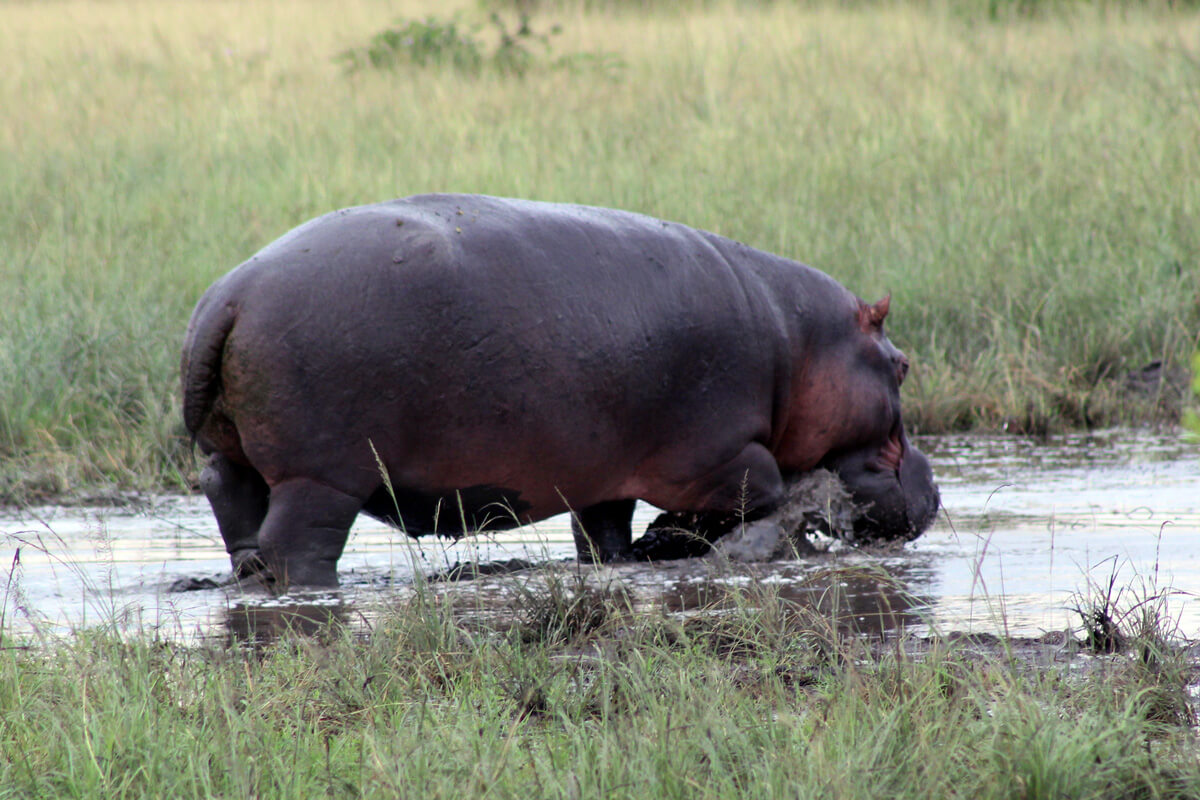
We had a lot of fun learning about some of the interesting facts that we didn't already know, and we hope this article can be equally as fascinating for you. And when you get to visit a place that has hippos in the wilderness, be sure to be on the lookout for some of the peculiar and interesting things you will already know about the hippopotamus.
We also hope that this article encourages more conservation work for hippos, mostly in the areas where the numbers are falling.
Interesting Facts About Hippos
1. What Hippos Look Like
You can recognize a hippo by the barrel-shaped torso, wide-opening mouths, column-like short legs, and nearly hairless bodies. Hippos are large animals and you will be able to see them near freshwater bodies in sub-Saharan Africa.
Hippos have thick, mostly hairless skin ranging from brownish-grey to purplish-black. Their short legs have webbed toes, allowing them to walk on land and swim efficiently.
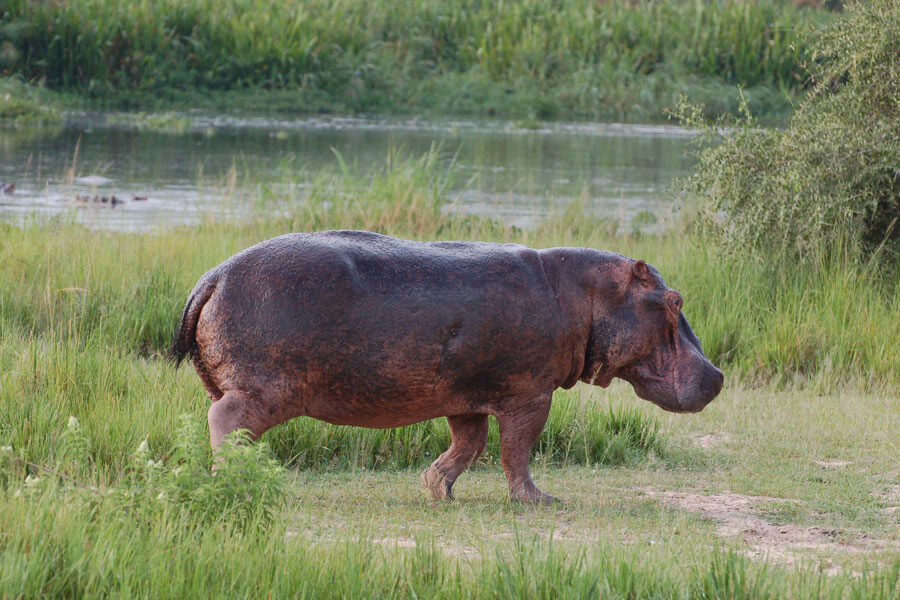
The hippo's wide mouth displays large, sharp teeth, but despite their appearance, hippos are herbivores, mainly consuming grass and vegetation. They have eyes, ears, and nostrils on the top of their head, enabling them to see, hear, and breathe while their entire body is submerged.
2. Closest Animal Relative
The closest animal relatives to a hippopotamus are dolphins, whales, and porpoises - all of which are ocean dwellers. The latest scientific findings predict that hippos and whales split into 2 groups around 54 million years ago.
While their body might trick you into thinking that hippos are related to other species of pigs, their closest relatives live in the sea.
3. Where Hippos Live
The natural habitat for hippos is Sub-Saharan Africa. Hippos live in areas with rivers, lakes, and mangrove swamps. This is because they need the water bodies for the daytime basking away from the scorching sun.
Hippos used to be spread all over sub-Saharan Africa and along the Nile delta but their home range has since shrunk down significantly. Hippos can be found in the wild in the following African countries. A visit to national parks in these countries can bring you face-to-face with these wild beauties.
|
|
|
|
|
|
|
|
|
|
|
|
|
|
|
|
Related article: Wild Habitat of hippos. Where to easily find hippos in Africa
4. Hippos' Size & Weight
Hippos are the 3rd largest land animal after the African Elephant and Rhinoceros. Hippos can measure up to 16 feet in length (head to tail) and as high as 5.4 feet on the shoulder.
On average, an adult hippo weighs between 1300 Kg and 1500 Kg. Male hippos are generally bigger and heavier than female hippos.
| HIPPOPOTAMUS | WEIGHT IN KG | WEIGHT IN LB |
|---|---|---|
|
1,500 - 1,800 kg | 3,300 - 3,900 lb |
|
1,300 - 1,500 kg | 2,800 - 3,300 lb |
|
4,500 kg | 9,900 lb |
In case you are wondering how a hippo compares with many other African animals, we have an article that compares the heaviest African animals. It also goes into how each animal benefits from the extra size.
5. Do Hippos Swim?
Even though hippos have webbed toes and spend much of their daytime in water, hippos are not considered good swimmers. Hippos usually stay in shallow waters where they can walk easily.
The barrel-shaped body of the hippo makes it easy for the hippo to float, but it is still a huge animal weighing too much to float. Hippos cross deeper water by sinking to the bottom and launching upward toward their intended direction.
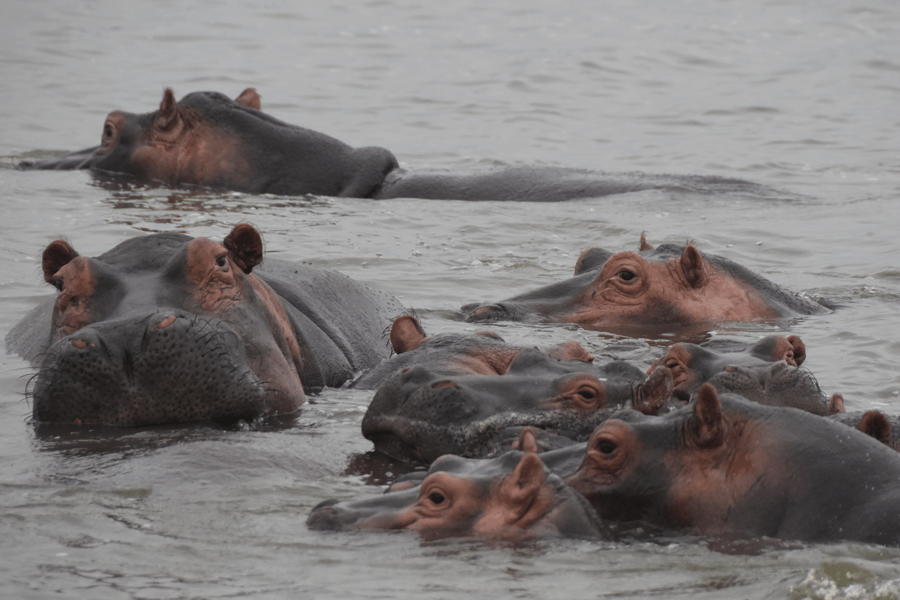
6. Do Hippos Breathe Underwater?
Hippos cannot breathe underwater. Like all mammals, hippos are not able to breathe underwater. A hippopotamus will take in a lot of air before sinking to the riverbed and holding its breath the entire time.
Hippos can hold their breath for more than 5 minutes at a time. When it needs to breathe in again, the hippo will rise to the surface and breathe in fresh oxygen - without even waking up.
While they are well adapted to fully hide underwater, most hippos will fully submerge in the water and keep just the top of their head above the surface so that they can easily breathe, as well as see and smell everything near them.
7. How Hippos Sleep
Hippos usually sleep whilst standing on their legs while submerged under the water. They can do this because of the automatic adaptation to rising above the water for breathing, which happens even when the hippo is fully asleep.
Much of a hippo's sleep will happen during the daytime when it is ideal to escape from the scorching tropical sun.
8. How Fast Do Hippos Run?
Don't let their large size and storky shape convince you that a hippo is a slow animal. Hippos are surprisingly fast despite their size. They can run at speeds of up to 19 miles per hour (30 kilometres per hour) in short bursts, especially when they feel threatened or need to defend their territory.
For Context, this is about the same running speed as a giraffe, an elephant or a grizzly bear. It is also the average speed for an adult human, just in case you thought you might be faster than any of these animals.
9. What Hippos Eat In The Wild
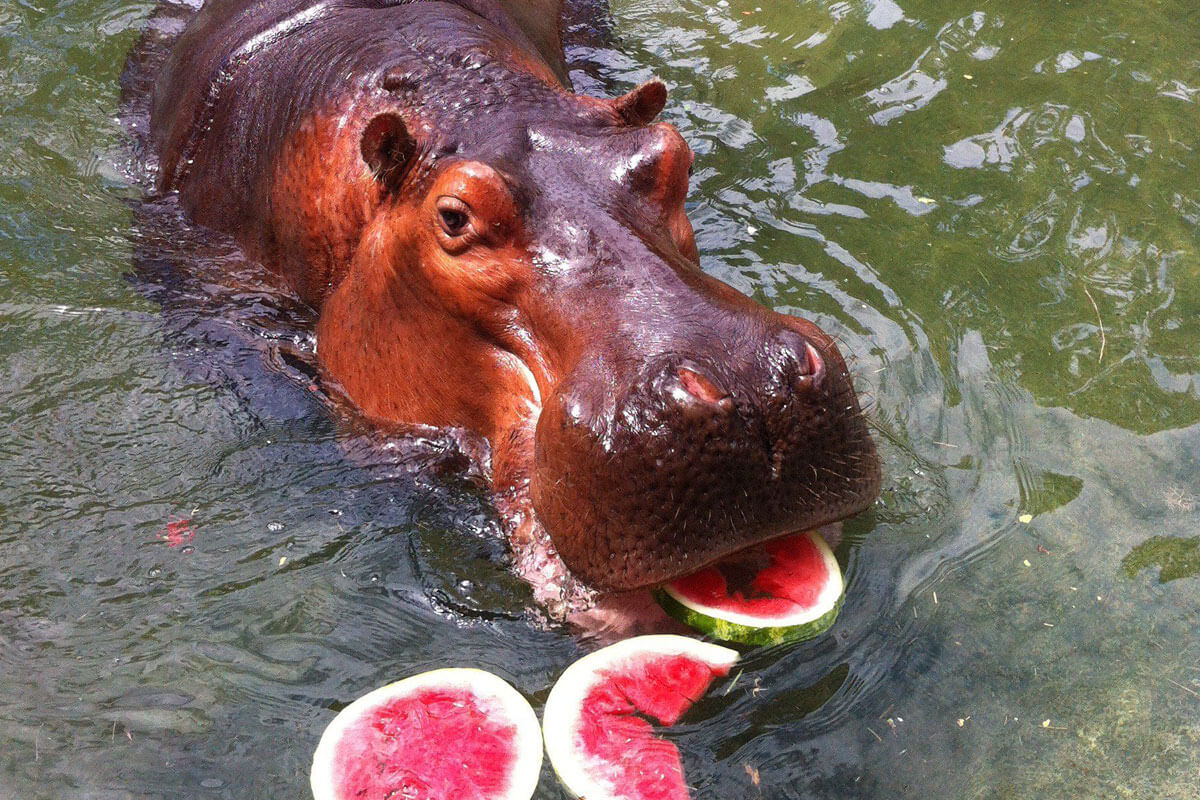
Hippos are herbivores and graze on short grasses as their main source of food. They graze for about 5 hours every day and consume around 68 Kg of food.
Compared with other animals, hippos consume less food as a percentage of their body weight. A hippo's daily food intake is less than 5% of its body weight.
Newer research and observations indicate that hippos might eat meat from time to time - but this is still inconclusive. Many researchers still regard this as an anomaly rather than fact-changing evidence.
Related article: What hippos eat in the wild & at the zoo
10. A School Of Hippos
A group of hippos can be referred to by various names such as Herd, Bloat, Dale, Pod, and School. All these terms can be used interchangeably but the most common is Herd.
Hippos usually live in groups of 20 to 30 animals. The largest pods can contain even more than 100 hippos but this is not common.
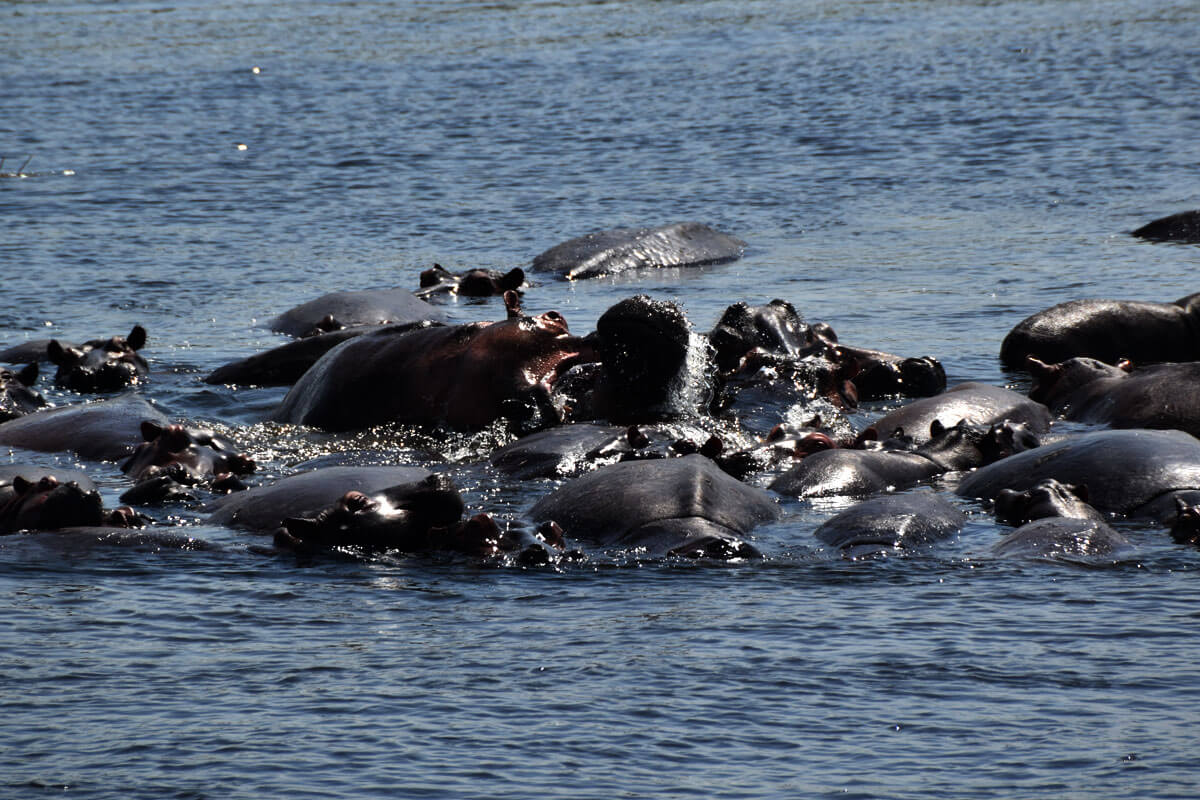
11. How Hippos Reproduce
Adult hippos usually mate towards the end of the wet season of rain. After a pregnancy of 8 months, female hippos give birth in water.
The calves are born weighing between 25 and 50 kilograms and have to move to the land to take their first breaths. The newly born young hippos stay in the water with their mother for up to 2 weeks and then start regularly being on land.
A female hippo reaches sexual maturity after 4 years while a male takes around 7.5 years.
12. How Hippos Mark Territory
When hippos are in the water, they become very territorial. When defecating, the dominant male of the herd marks the territory by using his tail to scatter the droppings.
Hippos can also use Yawning to communicate the extent of their territory and the power structure in a given herd.
When they are on land feeding, hippos are not territorial and tend to easily mix.
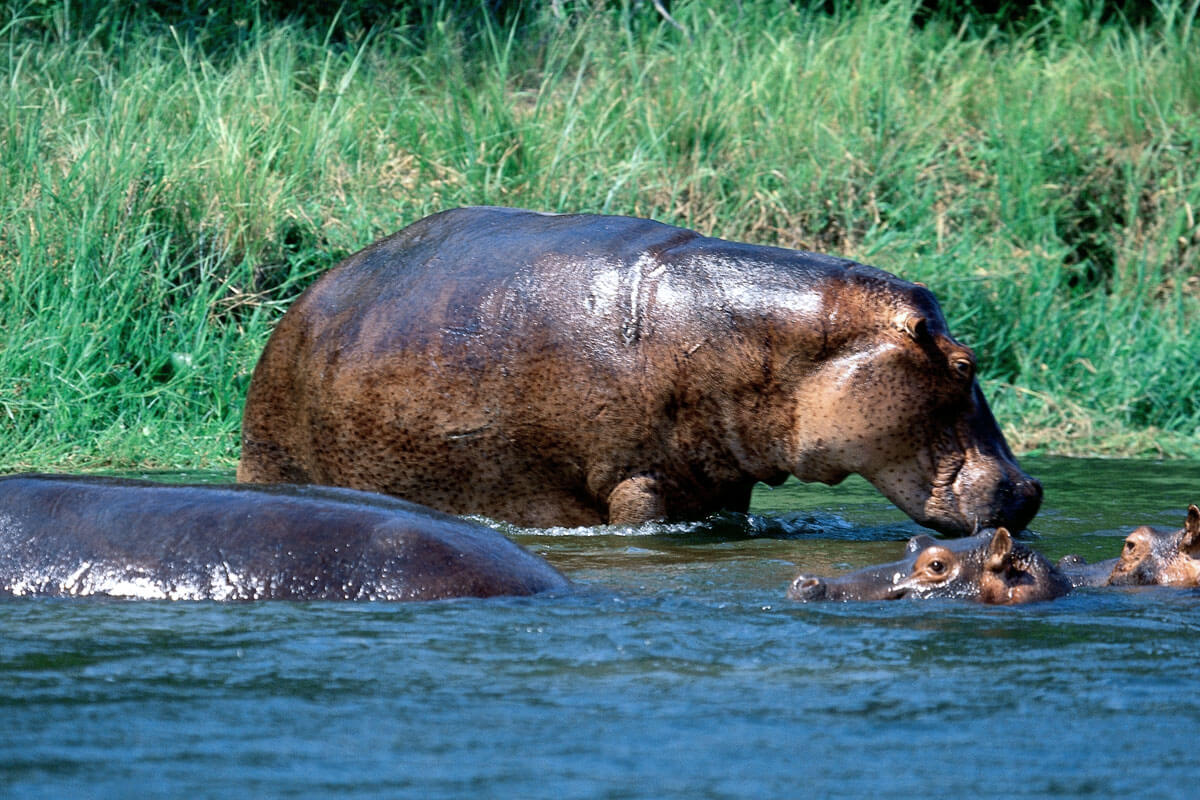
13. Lifespan Of Hippos
In the wild, hippos typically live between 40 to 50 years but can live longer in captivity. Except for the threats from human activity and intrusion, the only threats faced by hippos are when they are still small calves.
How long hippos live is greatly affected by factors such as the availability of food, predators and protection of their natural ecosystems.
Related article: Comparing the lifespan of African animals
14. Do Hippos Sweat Blood?
Hippos secrete some natural chemicals whose colour on their skin is slightly pink. This combination of natural acids is sometimes referred to as blood sweat.
The released chemicals in 'blood sweat' act as 'sunscreen' for the hippo and protect its bare and sensitive skin from the hot tropical sun. Besides blocking harmful ultraviolet light from the sun, these two chemicals help to inhibit bacteria - and thus prevent infections and diseases.
15. Why Hippos Yawn
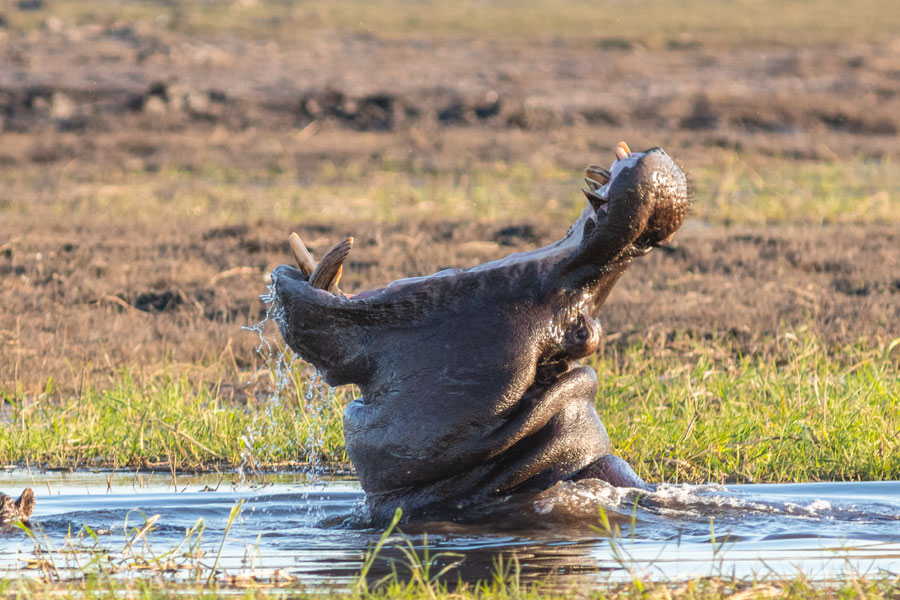
A Hippo's yawn will often afford you a great look at the marvel that is its wide-opening mouth - and some incredible pictures. However, the yawn of a hippo is a threat.
For other hippos, a yawn is also a way of establishing dominance over a given territory.
Whether it is a small yawn or a big one - that is worth a great photo, a hippo's yawn is not friendly. You should treat the 'laugh' as equally threatening. Hippos are very unpredictable and no chances should be taken.
16. Hippos Are Very Dangerous
Hippos are very dangerous to both humans and other animals. It is estimated that about 500 people die every year from attacks and related accidents by hippos. This is mostly local fishermen whose small wooden boats get capsized by hippos. Poachers also suffer the fate of hippos.
There are no known attacks on visitors and tourists because the guides and rangers are well-informed and take all the necessary precautions.
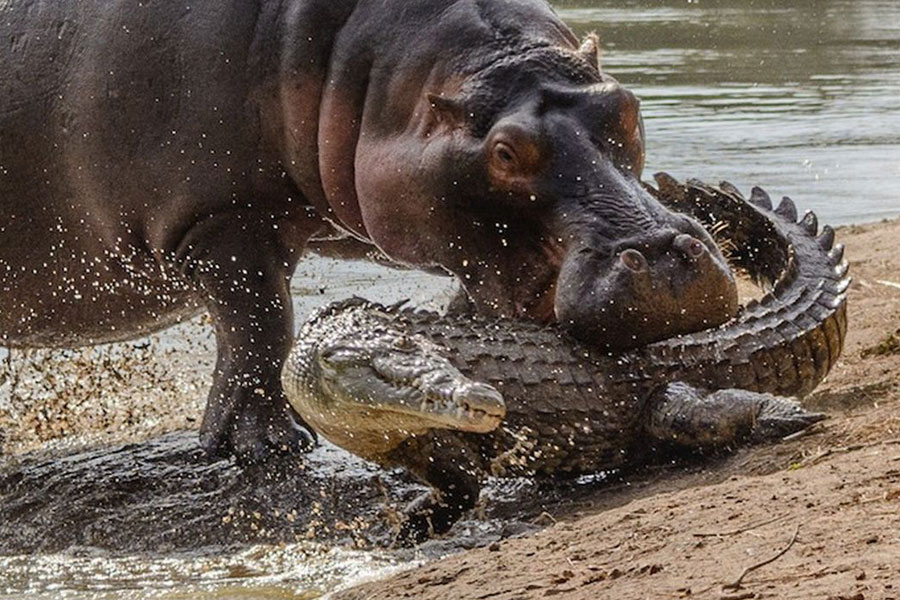
As far as other animals are concerned, a hippo doesn't have much competition because of its strength. An adult hippo can very easily kill a lion with one bite into the lion or crocodile.
We have a standalone article about why hippos are dangerous. It even explores how hippos would match up against other animals. Check it out if you want to dig deeper into the dangerous side of hippos.
17. How Hard Hippos Bite
Hippos have strong jaws and shaped teeth to exact one of the strongest bites in Africa. A hippopotamus has a bite force of around 2,000 PSI (Pounds Per Square Inch).
For Context, a human's bite force is around 126 PSI. The bite force of a Jaguar is around 1,500 PSI while that of an adult lion is about 650 PSI.
This strong bite force and a mouth that opens so wide is why a hippo can handle its battles with many animals in the wild.
Related article: Comparing the biteforce of African animals
18. Do Hippos Have Ivory?

The hippopotamus has slight amounts of ivory in their sharp and protruding incisor teeth. The amount of ivory is significantly less than what would be found in the task of an elephant.
Bans and restrictions on trade in elephant tusks have led to an increase in the poaching of hippos by people who are targeting ivory in their sharp incisors.
19. Threats To Hippos
Hippos face very few threats from other animals in the wilderness. Most of the threats from other animals are directed towards the younger hippos by Nile crocodiles and other predators. It would take a big pride of lions to put down one adult hippo - and the fight wouldn't be an easy one.
The biggest threat to hippos is humans. Whether this is from direct activities like poaching or the reduction of their natural habitat, humans remain the biggest threat to hippos and their natural ecosystem.
20. Conservation Status
According to the International Union for Conservation of Nature (UICN), hippos are regarded as vulnerable species. Here is the IUCN Redlist for hippos.
While the global population figure indicates stability, some individual places [and countries] have decreasing trends in their numbers while others are stable or increasing slightly. The biggest threat for hippos comes from human activity that encroaches on their natural habitat, among other things.
Final Thoughts
Given that a hippo's closest relatives are not land animals, you wonder how it comes to be best suited for the inland rivers in the Savannahs of sub-Saharan Africa.
Whether it is their mouths, their social life, or their temper, hippos are very interesting animals. While they are not famous as lions, hippos do get a great deal of respect in the bush.
Reading about hippos is exciting, watching them with your own eyes will add more life to these interesting facts we have shared with you.
Having the facts, and interests enhances your safari experience. You have some things to try and look out for. What do you think? Is seeing a hippo in the wild now on your bucket list?
